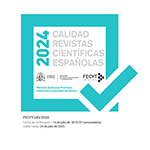Intergenerational fracture in the family care chain for people with Alzheimer's: the need for a professionalized care model
Abstract
Introduction. Care in the family environment for people with alzheimer's is mainly carried out by women; as a consequence of gender asymmetries in care. The objective is to analyze the current unsustainability over time of said model due to the change in expectations and values by the new generations of women. Methodology. The methodology applied is of a qualitative nature, 16 women -spouses- who exclusively provide this care have been interviewed; as well as the discursive analysis of a discussion group, made up of 10 young women, as a contrast. Results. Our research show that the woman caregiver is currently the main basis for the care and response to the needs of dependent people with alzheimer's. Such demanding and prolonged care progressively and inexorably increases the physical and psychological stress of these women in the exercise of their family responsibilities. Discussion. The results point to the fact that the crisis in the highly demanding care model, dependents with alzheimer's disease, evidences both the unsustainability of said model -lack of generational change due to the change in life expectancies by young women-, as well as the inherent limitations of elderly caregivers in a highly demanding care praxis. At the same time, the current crisis of these high-demand care modes in relation to their sustainability over time is confirmed.. That is to say, the internal weakness, as it is socially organized, is unsustainable over time, due to the intergenerational rupture between mothers and daughters in the provision of highly demanding family care. Conclusions. Our conclusion refers to the need for a paradigm shift in the current provision of care in the family environment that allows a new professionalized model in the provision of services, which will allow deactivating the gender effect in such highly demanding care. The re-construction of discourses and practices in the context of highly demanding care is necessary and cannot be postponed. If it is possible to deactivate the current asymmetry in family care, from a gender perspective, it will be contributing to the construction of a more equitable and egalitarian society.
Downloads
Article download
License
In order to support the global exchange of knowledge, the journal Cuadernos de Trabajo Social is allowing unrestricted access to its content as from its publication in this electronic edition, and as such it is an open-access journal. The originals published in this journal are the property of the Complutense University of Madrid and any reproduction thereof in full or in part must cite the source. All content is distributed under a Creative Commons Attribution 4.0 use and distribution licence (CC BY 4.0). This circumstance must be expressly stated in these terms where necessary. You can view the summary and the complete legal text of the licence.









